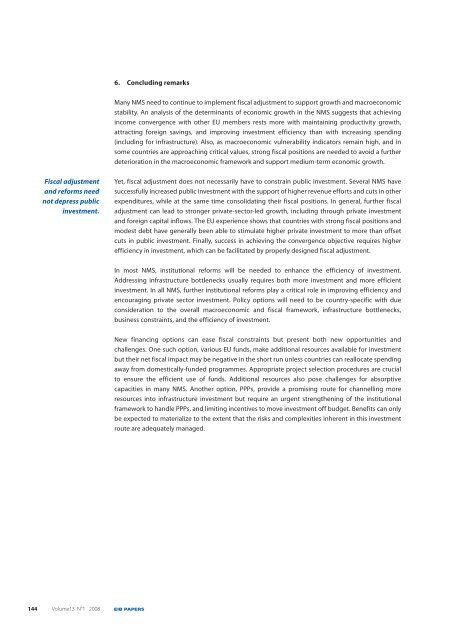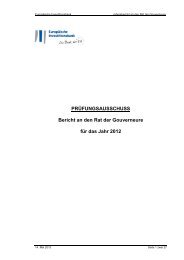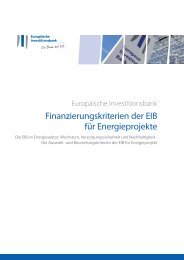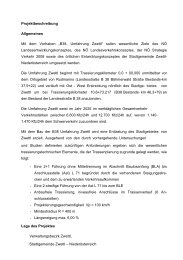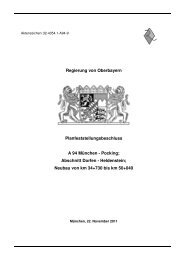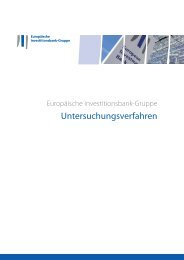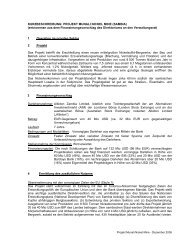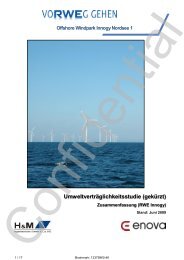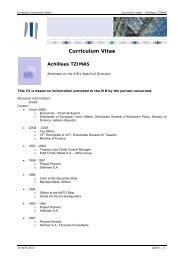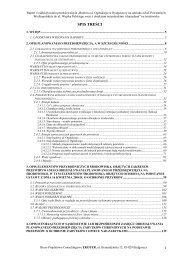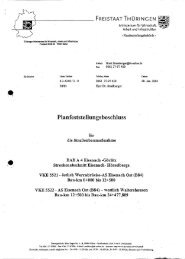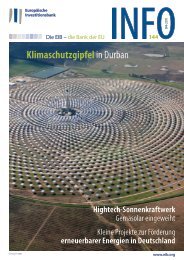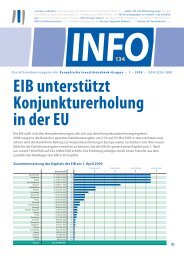EIB Papers Volume 13. n°1/2008 - European Investment Bank
EIB Papers Volume 13. n°1/2008 - European Investment Bank
EIB Papers Volume 13. n°1/2008 - European Investment Bank
You also want an ePaper? Increase the reach of your titles
YUMPU automatically turns print PDFs into web optimized ePapers that Google loves.
Fiscal adjustment<br />
and reforms need<br />
not depress public<br />
investment.<br />
144 <strong>Volume</strong>13 N°1 <strong>2008</strong> <strong>EIB</strong> PAPERS<br />
6. Concluding remarks<br />
Many NMS need to continue to implement fiscal adjustment to support growth and macroeconomic<br />
stability. An analysis of the determinants of economic growth in the NMS suggests that achieving<br />
income convergence with other EU members rests more with maintaining productivity growth,<br />
attracting foreign savings, and improving investment efficiency than with increasing spending<br />
(including for infrastructure). Also, as macroeconomic vulnerability indicators remain high, and in<br />
some countries are approaching critical values, strong fiscal positions are needed to avoid a further<br />
deterioration in the macroeconomic framework and support medium-term economic growth.<br />
Yet, fiscal adjustment does not necessarily have to constrain public investment. Several NMS have<br />
successfully increased public investment with the support of higher revenue efforts and cuts in other<br />
expenditures, while at the same time consolidating their fiscal positions. In general, further fiscal<br />
adjustment can lead to stronger private-sector-led growth, including through private investment<br />
and foreign capital inflows. The EU experience shows that countries with strong fiscal positions and<br />
modest debt have generally been able to stimulate higher private investment to more than offset<br />
cuts in public investment. Finally, success in achieving the convergence objective requires higher<br />
efficiency in investment, which can be facilitated by properly designed fiscal adjustment.<br />
In most NMS, institutional reforms will be needed to enhance the efficiency of investment.<br />
Addressing infrastructure bottlenecks usually requires both more investment and more efficient<br />
investment. In all NMS, further institutional reforms play a critical role in improving efficiency and<br />
encouraging private sector investment. Policy options will need to be country-specific with due<br />
consideration to the overall macroeconomic and fiscal framework, infrastructure bottlenecks,<br />
business constraints, and the efficiency of investment.<br />
New financing options can ease fiscal constraints but present both new opportunities and<br />
challenges. One such option, various EU funds, make additional resources available for investment<br />
but their net fiscal impact may be negative in the short run unless countries can reallocate spending<br />
away from domestically-funded programmes. Appropriate project selection procedures are crucial<br />
to ensure the efficient use of funds. Additional resources also pose challenges for absorptive<br />
capacities in many NMS. Another option, PPPs, provide a promising route for channelling more<br />
resources into infrastructure investment but require an urgent strengthening of the institutional<br />
framework to handle PPPs, and limiting incentives to move investment off budget. Benefits can only<br />
be expected to materialize to the extent that the risks and complexities inherent in this investment<br />
route are adequately managed.


